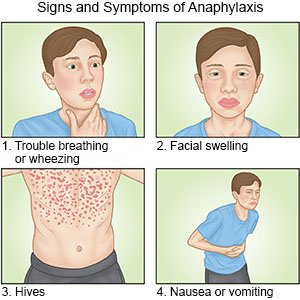Allergy Testing
Medically reviewed by Drugs.com. Last updated on Apr 6, 2025.
What is allergy testing?
Allergy testing is a way to find out if you are allergic to something, called an allergen. Common allergens include pet dander, pollen, insect bites or stings, and certain foods, such as peanuts. Your healthcare provider will use an allergy test to check your body's response to the allergen. During the test, your provider will watch for small skin reactions that show you are probably allergic. Your provider will also watch for a rare but serious reaction called anaphylaxis that needs immediate treatment. You will need to watch for a reaction that develops later, after you are home.
How do I prepare for an allergy test?
Talk to your healthcare provider about all medicines you take. Some medicines may keep the allergy test from working correctly. You may need to stop taking certain medicines days, weeks, or months before your test. Examples include antihistamines, topical steroids, and medicines to stop vertigo or relieve insomnia. Your provider will tell you if you need to stop any medicine, and when to stop it. Your provider will also tell you when you can start taking the medicine again after your allergy test.
What are the different kinds of allergy tests?
- A skin prick test is used to check for a reaction to an allergen applied to your skin. Your healthcare provider will place drops of solution on your skin. Each drop will contain a small amount of 1 possible allergen. Your provider will then prick or scratch the skin under the drops. This will help the solution get into your skin. If your skin becomes raised, red, and itchy within 20 minutes, you may be allergic to that allergen.
- An intradermal test is used to check for a reaction to an allergen injected under the skin of your upper arm. This may be used if your skin does not react during a skin prick test but you may still be allergic to an allergen. Your provider will inject the allergen into your skin and check for a reaction in about 15 minutes. If your skin becomes raised, red, and itchy within 20 minutes, you may be allergic to that allergen.
- A patch test is used to check for a reaction to an allergen taped to your skin. The allergen is put onto a pad. The pad is taped to your skin. You will then come back in 3 days and have the area checked for a reaction. You will come back again at day 5 to 7 to have it checked again. Your provider will wait 15 to 60 minutes after removing the pad to check for a reaction. This is because you may have some skin irritation from where the pad was taped to your skin. The irritation can be mistaken for an allergic reaction. You cannot get the patch test area wet during this test.
- A blood test may be used if you have certain rashes or take medicine that make skin testing difficult to do. Blood tests may be used for people who are at risk for anaphylaxis during other kinds of allergy testing. Anaphylaxis is a life-threatening reaction to an allergen. A sample of your blood is tested to see if it contains antibodies to specific allergens.
What should I expect after my allergy test?
- You and your healthcare provider will talk about the results of your allergy test. If you had a positive test result, this means you showed signs of an allergic reaction to an allergen. You and your provider can talk about any additional tests you may need. The tests can find how severe the allergy is and if you may need medicine to prevent or control a reaction. This is called an action plan.
- Rarely, after a prick or intradermal test, you may develop signs of an allergic reaction. Depending on the kind of test you had, you will need to watch for signs of an allergic reaction. This can happen within hours of an allergy test. Your provider will tell you what to do if you have a reaction. You may need to take an antihistamine or other medicine to stop the reaction.
Call your local emergency number (911 in the US) if:
- You have any of the following signs or symptoms of anaphylaxis:

- Itching, a rash, hives that spread over your body
- Trouble breathing, swelling in your mouth or throat, or wheezing
- Feeling you are going to faint
When should I seek immediate care?
- You have new or worsening rashes, hives, or itching.
When should I call my doctor?
- You have an upset stomach or are vomiting.
- You have stomach cramps or diarrhea.
- You have questions or concerns about your condition or care.
Care Agreement
You have the right to help plan your care. Learn about your health condition and how it may be treated. Discuss treatment options with your healthcare providers to decide what care you want to receive. You always have the right to refuse treatment. The above information is an educational aid only. It is not intended as medical advice for individual conditions or treatments. Talk to your doctor, nurse or pharmacist before following any medical regimen to see if it is safe and effective for you.© Copyright Merative 2025 Information is for End User's use only and may not be sold, redistributed or otherwise used for commercial purposes.
Further information
Always consult your healthcare provider to ensure the information displayed on this page applies to your personal circumstances.
